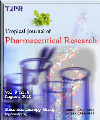
|
Tropical Journal of Pharmaceutical Research
Pharmacotherapy Group, Faculty of Pharmacy, University of Benin, Benin City, Nigeria
ISSN: 1596-5996
EISSN: 1596-5996
Vol. 15, No. 11, 2016, pp. 2371-2381
|
 Bioline Code: pr16313
Bioline Code: pr16313
Full paper language: English
Document type: Research Article
Document available free of charge
|
|
|
Tropical Journal of Pharmaceutical Research, Vol. 15, No. 11, 2016, pp. 2371-2381
| en |
In vitro and in vivo hepatoprotective activity of extracts of aerial parts of Bidens pilosa  L (Asteraceae) L (Asteraceae)
Abdel-Ghany, Rasha Hassan; Barakat, Waleed Mohammed; Shahat, Abdelaaty Abdelaziz; Abd-Allah, Walid El-Sayed & Ali, Elzahraa Atef
Abstract
Purpose: To investigate the protective effects of aqueous and methanol extracts of Bidens pilosa using
various in vivo and in vitro models of hepatic injury.
Methods: One kilogram of the aerial parts of Bidens pilosa was used to prepare 80 % methanol and
aqueous extracts of the plant (500 g for each extract). The total phenolic content (TPC), total flavonoid
content (TFC), and antioxidant activity of both extracts were evaluated. The hepatoprotective activity of
these extracts in carbon tetrachloride (CCl4, 0.1 %) and D-galactosamine (700 mg/kg)-induced liver
injury, respectively, was investigated in mice. Paracetamol-induced liver injury was used as in vitro
reference standard.
Results: TPC and TFC of methanol extract were higher than those of the aqueous extract. The
combination of methanol extract and silymarin showed the highest antioxidant activity. In vivo
administration of CCl4 and D-galactosamine significantly increased the levels of alanine
aminotransferase (ALT), aspartate aminotransferase (AST), and alkaline phosphatase (ALP), but
decreased the total protein, albumin and glutathione (GSH) contents of liver. Co-administration of the
extracts (50 mg/kg) and silymarin (100 mg/kg) effectively countered the effects of CCl4 and D-galactosamine,
while also exerting their antioxidant properties. Both methanol and aqueous extracts
showed hepatoprotective activity in paracetamol-induced cytotoxicity in primary cultures of rat
hepatocytes.
Conclusion: Bidens pilosa possesses significant in vivo and in vitro hepatoprotective activity in mice
and may be therapeutically useful as a protective agent in acute liver injury.
Keywords
Bidens pilosa; D-galactosamine; Carbon tetrachloride; Paracetamol; Liver injury; Hepatoprotective; Antioxidant; Silymarin; Hepatocytes
|
| |
© Copyright 2016 - Pharmacotherapy Group, Faculty of Pharmacy, University of Benin, Benin City, 300001 Nigeria.
Alternative site location: http://www.tjpr.org
|
|
